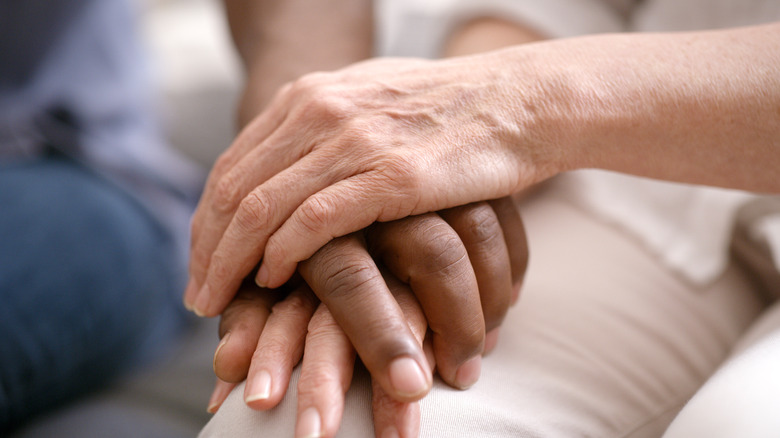This Organism Stays Alive In The Body Even After Death
In the conversation surrounding what happens to your body after you die, there's often a sense of finality. Life has ended and death has taken its place; this is how most of us might view someone's passing.
But science tells us that there are organisms inside our body — bacteria living primarily in our gut, also called gut microbes, gut microbiome, or gut flora — that continue to live on for hours until our body fully decomposes. Some even think they survive for years after we've died, in the soil and natural habitat we are buried in, per The Conversation. They are nature's agents that help our bodies decompose.
So what exactly happens when we die? How do these gut flora help the process of decomposition? When we're alive, the microbes that live in our gut do the all-important work of helping us digest the food we consume, fight off infection while working in conjunction with our immune system, manufacture important vitamins, etc. They do this with fuel derived from the food we supply. What happens when we die?
Gut organisms start feeding on our body inside out when we die
When your heart stops beating, there's no more blood or oxygen being pumped through your body. This creates a disruption of the smoothly running ecosystem that hitherto existed inside — a system that involved oxygen inhalation and circulation, carbon dioxide exhalation, and waste management, per McGill University.
This hindrance eventually leads to what is known as autolysis, more commonly known as self-digestion (via BBC). Self-digestion is when the enzymes that were located within your body's cells start digesting the cells themselves because they're now deprived of oxygen, per The Conversation. Self-digestion is most rampant in parts of your body where enzymes are most concentrated, like the pancreas, liver, and stomach (per McGill University). This process of autolysis offers an alternate fuel source for the gut microbes, who feed on the products of cells breaking down and move on outside of your gut to other areas of your body.
All of this is what is called putrefaction, and it affects what happens to your skin just after death, too. The gas released as a byproduct of putrefaction is what results in the stench of death and also the bloated appearance and discoloration of the skin.
Microbes of the gut could live on for years after your body decomposes
It is not a stretch to call the entire process of death and decomposition long. In fact, according to science, the living organisms inside your body that aid the decomposition process can live long past the months it takes for you to wither into the ground. Per The Conversation, there is some evidence pointing to the fact that these bacteria adapt to the soil and its environment and live for years. They might even be contributing to the essential work of nitrogen recycling that aids plant life.
It is safe to say that there's an intricate and complex journey that your body takes after life has left it. According to pathology technician Carla Valentine (via Medical News Today), living organisms outside your body also aid in the decomposition process. "As revolting as they may seem, flies and their larvae — maggots — are created perfectly for the job they need to do and many experts call them 'the unseen undertakers of the world,'" she explained in her book "The Chick and the Dead: Life and Death Behind Mortuary Doors."
While it might seem morbid, unsightly, and even unsettling to know that the organisms living inside us right now when we're alive will one day eat us inside out to help the process of death, it is also enlightening to know that there's a system in place — a natural order for everything in this world.


